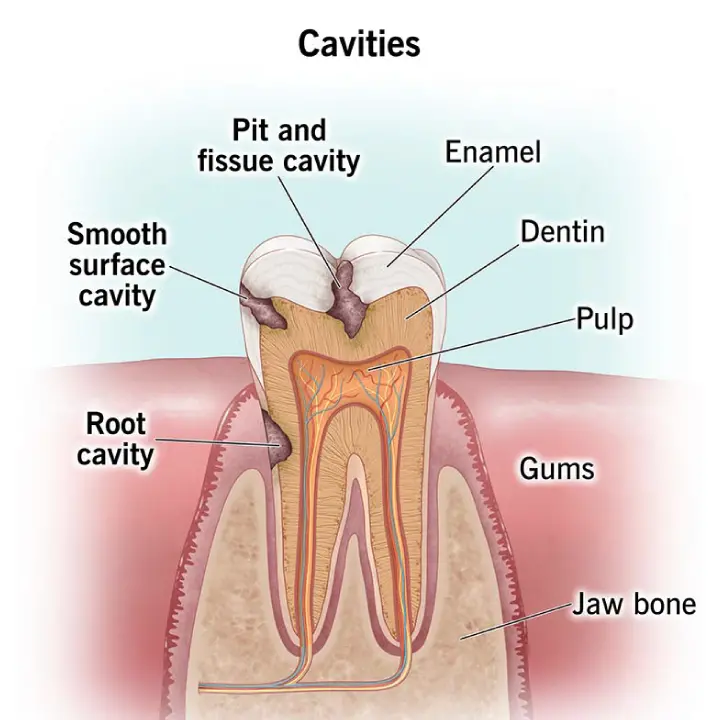
Cavities
Cavities are areas of decay on your tooth’s surface. They form when bacteria and acids in the mouth gradually erode the enamel, which is the protective layer of our teeth. Cavities start as small holes and can grow larger over time if left untreated—but good news! Your Celebrate Dental team can help.
What causes cavities?
The most common cause of cavities is poor dental hygiene and a high-sugar, high-starch diet. When food particles and bacteria are not removed, plaque forms on your teeth. Plaque acids gradually dissolve the tooth’s enamel, leading to cavity formation.
Dry mouth, certain medications and a genetic predisposition can also increase your risk of cavities.
Different types of cavities
Pit and fissure cavities
These are the most common type of cavities, forming on the chewing surfaces of molars and premolars. They develop in the small pits and fissures of the tooth’s surface where food particles and bacteria can easily get trapped.
Smooth surface cavities
These cavities form on the flat, smooth surfaces of the teeth in areas where bacterial plaque collects, such as between teeth, along the gum line, and in difficult-to-clean areas.They progress more slowly than pit and fissure cavities and are often easier to detect and treat in their early stages.
Root cavities
Root cavities form on the roots of the teeth. They are common in older adults or if you have gum recession. As the root surface becomes exposed, it becomes susceptible to decay, especially near the gumline.
Recurrent or secondary cavities
These cavities develop around previous dental work, such as fillings or crowns. Bacteria can find its way inside the restoration, causing decay in the remaining part of the tooth.
Erosion cavities
Unlike typical cavities caused by bacteria, erosion cavities are caused by direct chemical erosion of the tooth enamel by acidic foods, sugary drinks or stomach acids from conditions like acid reflux.
Baby bottle tooth decay (early childhood caries)
Baby bottle tooth decay (early childhood caries)
This type of cavity affects infants and young children due to prolonged exposure of sugary liquids like milk, formula or fruit juices in baby bottles or sippy cups.
What causes cavities?
The most common cause of cavities is poor dental hygiene and a high-sugar, high-starch diet. When food particles and bacteria are not removed, plaque forms on your teeth. Plaque acids gradually dissolve the tooth’s enamel, leading to cavity formation.
Dry mouth, certain medications and a genetic predisposition can also increase your risk of cavities.
How to get prevent cavities
A thorough oral care routine is the best way to prevent cavities.
Oral hygiene
Balanced diet
Fluoride treatment
Regular dental checkups
Cavity frequently asked questions?
Do cavities hurt?
Your cavity may not hurt in the beginning. However, as tooth decay progresses deeper into the layers of the tooth, you may begin to experience toothaches and sensitivity.
Can I get a cavity between my teeth?
Yes, you can get cavities between your teeth. They are known as “interproximal cavities” or “interdental cavities and occur when food gets caught in between your teeth and you don’t floss regularly.
Can I prevent cavities if I have braces?
Yes, you can prevent cavities even if you have braces. Maintaining good oral hygiene is even more crucial when you have braces, as they create additional spaces for food particles and plaque to accumulate, increasing the risk of cavities and other dental issues.
Are cavities contagious?
No, you cannot catch a cavity from someone else. Cavities are caused by a combination of factors, primarily the presence of certain bacteria in the mouth, a diet high in sugars and carbohydrates, poor oral hygiene and genetic predisposition.
Can my tooth paste and mouthwash help prevent cavities?
Yes, there are toothpaste and mouthwash products specifically designed to help prevent cavities. Ask your Celebrate Dental dentist which products they recommend.
Discover more for your smile
Our Doctors’ Affiliations






